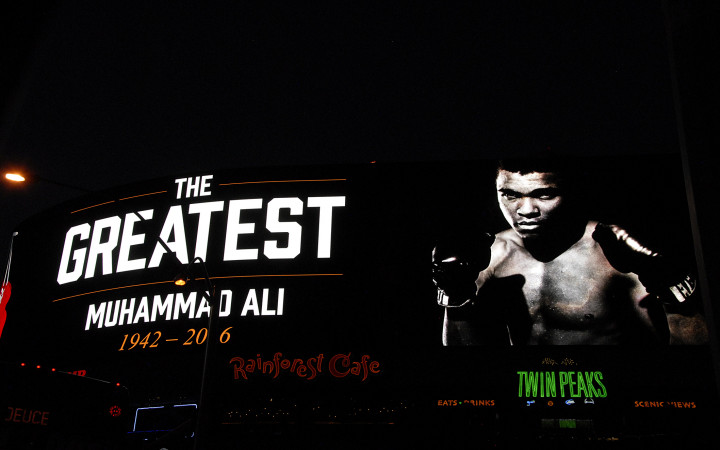Today’s Wonder of the Day was inspired by Zarrar. Zarrar Wonders, “WHO IS MUHAMMAD ALI” Thanks for WONDERing with us, Zarrar!
Let’s start today’s Wonder of the Day with a story. One day in 1954, a 12-year-old boy in Louisville, Kentucky, found that his prized bicycle had been stolen. Angry, he made his way to the nearby Columbia Gym. There, he reported the crime to a police officer named Joe Martin who trained boxers at the gym. Martin offered to teach the boy to fight.
Have you heard this story before? If so, you know the boy took Martin up on his offer. He learned to box. Later, many would call him The Greatest. Others referred to him as the Louisville Lip. He was known to float like a butterfly and sting like a bee. That’s right! Today’s Wonder of the Day is all about Muhammad Ali.
Training with Joe Martin, Ali quickly showed promise as a fighter. He worked hard and won several national tournaments. Then, in 1960, he competed in the Olympic Games in Rome. Ali won the gold medal for boxing in his weight class.
Back home, though, Ali faced discrimination. The Civil Rights Movement of the 1960s was well underway, and Ali was frustrated at being treated like a second-class citizen. One legend holds that Ali threw his gold medal into the Ohio River after being refused service at a segregated lunch counter in Louisville. Was this story true? No one knows for sure. However, no one knows where Ali’s gold medal is today, either.
Soon, the young boxer became as well known for his personality as for his talent. Ali’s charm, wit, and confidence were unmatched. He often spoke in rhyme. When he had an upcoming match, Ali would predict the round in which he would win. He was also never one to downplay his own talent—in fact, he called himself “The Greatest” long before anyone else did.
In February 1964, Ali set his eyes on a prize even bigger than Olympic gold. He challenged Sonny Liston to a match for the heavyweight boxing championship of the world. Ali said he would win in the eighth round. Many people disagreed. They thought Liston would easily beat the young boxer. But Ali won the match—and he did so in only six rounds.
Two days after becoming the heavyweight champion of the world, Ali announced his conversion to Islam. He also shared that he was a member of the Nation of Islam, an organization of Black American Muslims in the U.S. He had been introduced to their beliefs by his friend Malcolm X. At that time, the group was known for teaching Black nationalism as well as the ideals of Islam.
In 1966, Ali learned that he had been drafted into the U.S. Army. He had been very publicly against the Vietnam War, saying he had no “quarrel with them Vietcong.” Ali said, “The real enemy of my people is here,” explaining that he did not plan to enter the war while he and other Black people were denied human rights in the U.S. In April 1967, Ali officially refused to serve in the war. He cited his Muslim faith and said he was a conscientious objector.
As a result, Ali was sentenced to five years in prison. However, he appealed this conviction and remained free. Still, he was stripped of his title and banned from boxing in the U.S. He was scorned by many people across the nation who saw his decision as unpatriotic.
In 1970, Ali’s conviction was overturned by the Supreme Court of the U.S. He returned to the ring determined to earn back his title. In 1971, Ali challenged then-champion Joe Frazier. The two fought for 15 rounds before Frazier was declared the winner. It was the first loss of Ali’s career.
Do you think Ali let that stop him? Of course not! He kept training, and, two years later, he beat Frazier in a rematch. Then, in 1974, he defeated George Foreman to become the heavyweight champion of the world for a second time. He lost and reclaimed the title for the third time in 1978.
Ali retired from boxing in 1981. His final record included 56 wins and only five losses. 37 of his wins were knockouts. He was later inducted into the International Boxing Hall of Fame in 1990. He also lit the Olympic Flame in 1996. In 2005, Ali was awarded the Medal of Freedom.
Muhammad Ali also left the Nation of Islam. Still, he remained a devoted Muslim for the rest of his life. He became a philanthropist, involved with the Special Olympics and Make-a-Wish Foundation. He also supported the Muhammad Ali Parkinson Center. He opened the Muhammad Ali Center in Louisville in 2005 to “inspire people to be the best that they could be.”
Ali passed away on June 3, 2016. Today, he’s remembered as one of the greatest athletes of all time. Boxing enthusiasts know him for moves like the Ali Shuffle and rope-a-dope. He’s also remembered for his wish to inspire others to respect one another. What do you think is the most important legacy of Muhammad Ali?
Standards: CCRA.L.3, CCRA.L.6, CCRA.R.1, CCRA.R.2, CCRA.R.4, CCRA.R.10, CCRA.SL.1, CCRA.SL.2, CCRA.W.2, CCRA.W.9, CCRA.L.1, CCRA.L.2




